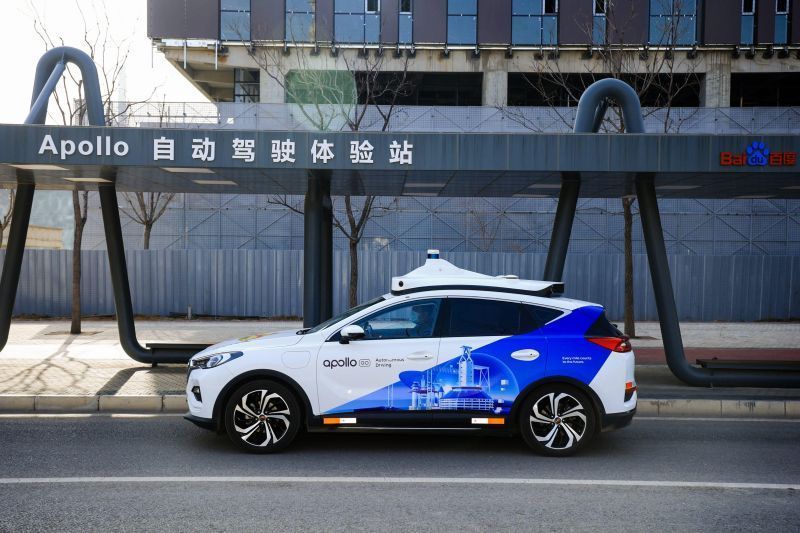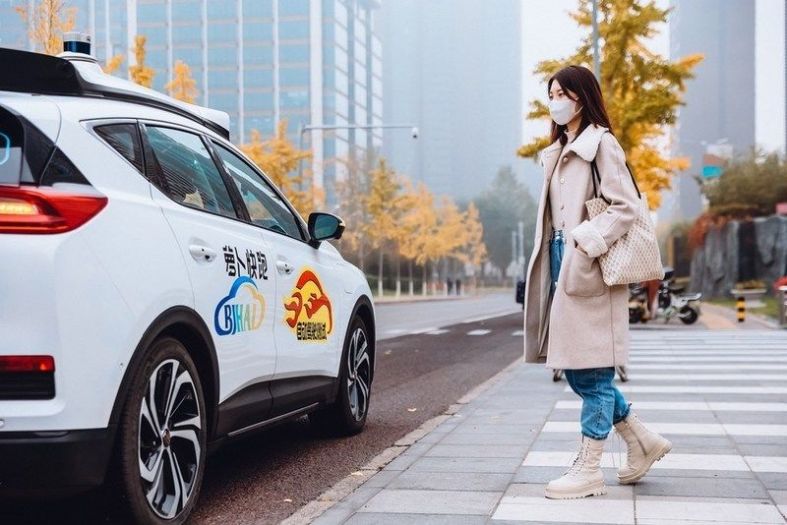China's Baidu Receives the First-Ever Permit to Operate its ‘Apollo Go' Robotaxi Service in Beijing Without Safety Drivers Onboard
【Summary】China's Baidu Inc. has received the first-ever permits in China authorizing the company to provide fully-driverless ride-hailing services to the public in Beijing, meaning that no safety drivers will be present in the vehicles. The robotaxi vehicles will offer rides to passengers in a designated area of 60 square kilometers in the city. Baidu aims to be one of the world's first companies to scale and commercialize autonomous driving technology in China.

Baidu Inc., which is the equivalent of Google in China, is widely considered to be one of the country's leading developers of autonomous driving technology. The company has been working on autonomous driving technology since 2014. In 2017, Baidu launched its open Apollo project, which fosters collaboration between industry partners to rapidly speed up the development of safe autonomous driving technology.
As part of Apollo, Baidu is launching an app-based robotaxi service in China called "Apollo Go" where customers can summon a ride in a driverless vehicle. Apollo Go uses a similar model as U.S. ride-hailing companies Uber and Lyft. Riders use an app to summon a driverless car and wait at a local station for the vehicle to pick them up.
Now Baidu has received the first-ever permits in China authorizing the company to provide fully-driverless ride-hailing services to the public in Beijing, meaning that no safety drivers will be present in the Apollo Go vehicles.
The permits were issued by the head office of the Beijing High-level Automated Driving Demonstration Area (BJHAD). It allows Baidu to deploy ten autonomous vehicles without drivers behind the steering wheel. The vehicles will offer rides to passengers in a designated area of 60 square kilometers in Beijing.
The new permit represents Beijing's collaborative and safety-first approach to autonomous vehicle regulation, progressing from testing with safety drivers behind the wheel to the fully driverless stage. It also represents a benchmark achievement in the autonomous vehicle industry, as the complex and crowded streets of Beijing are some of the most challenging environments for a self-driving vehicle to operate in.
Baidu has accumulated 16 million miles of testing on public roads over the past 9 years with zero traffic accidents, including mileage recorded by driverless test cars in multiple cities across China as well as in California.
"After rounds of rigorous examination, testing and evaluation, Baidu has obtained first-ever permits in China that authorize the company to provide driverless ride-hailing services to the public on open roads," said Wei Dong, Vice President and Chief Safety Operations Officer of Baidu Intelligent Driving Business Group. "Moving forwards, these "driverless vehicles" will provide standardized passenger service on urban roads and truly become part of people's daily living."

The recent regulatory approval marks a significant milestone for the autonomous ride-hailing industry in China, and mark the first toward a fully driverless mobility future, with a fleet of autonomous ride-hailing vehicles capable of operating without human intervention.
These newly licensed self-driving vehicles will join an existing fleet of Apollo Go vehicles in the capital city of China. Starting April 28, users will be able to hail a driverless ride using the Apollo Go mobile app in the daytime hours between 10:00am and 4:00pm.
Since the Apollo Go vehicles are designed to operate without safety drivers on board, they're backed by a 5G-powered "Remote Driving Service". It allows a human operator to take over control of the vehicle remotely in the event the software encounters any unexpected obstacles during the trip, such as a stalled vehicle or lane closure due to construction.
Since its launch in 2020, Apollo Go has expanded to 9 cities in China, including Beijing, Shanghai, Shenzhen and Guangzhou. In the fourth quarter of 2021, Apollo Go provided 213,000 autonomous rides.
Shenzhen's Nanshan District is home to some of the country's top tech companies, including Tencent and Huawei. It's also one of the most densely populated areas in south China which opens Apollo Go to more customers.
Baidu aims to be one of the world's first companies to scale and commercialize autonomous driving technology in China, which is the world's largest auto market.
Baidu's other recent investments include building its "Apollo Computing Unit" (ACU) for self-driving cars, HD Maps, advanced driver assist systems (ADAS), autonomous parking features, 5G connected vehicle technology and autonomous buses.
In June 2021, Baidu revealed a fully-electric robotaxi SUV called "Apollo Moon" that will eventually be used in the expanding Apollo Go service. At the time, Baidu said the Apollo Moon vehicles were a monumental milestone in the large-scale commercialization of fully autonomous ride-hailing services in China.
Baidu plans to deploy 1,000 Apollo Moon robotaxis over the next several years in China. The company plans to expand its Apollo Go operations into 65 cities across China by 2025 and to 100 by 2030.
-


Ford is Testing a New Robotic Charging Station to Assist Drivers of EVs With Disabilities
-


Ford Raises the Prices of the F-150 Lightning Electric Pickup Due to Rising Raw Material Costs
-


The BMW 7-Series to Feature HD Live Maps From HERE Technologies for Hands-Free Highway Driving in North America at Speeds up to 80 MPH
-


AutoX to Use the 'Eyeonic Vision Sensor' from California-based SiLC Technologies for its Robotaxi Fleet in China
-


LG Develops ‘Invisible’ Speaker Sound Technology That Could Revolutionize In-Vehicle Audio
-


Researchers at South Korea’s Chung-Ang University Develop a ‘Meta-Reinforcement’ Machine Learning Algorithm for Traffic Lights to Improve Vehicle Throughput
-


Zeekr’s New 009 Electric Passenger Van is the World’s First EV to Feature CATL’s Advanced ‘Qilin’ Battery With a Range of 510 Miles
-


Redwood Materials is Building an Electric Vehicle Battery Recycling Facility in South Carolina
- Volvo’s Parent Company Geely Launches a New Outdoor Lifestyle EV Brand Named 'RADAR'
- Sony, Honda Sign Agreement for Joint EV Brand
- Qualcomm Technologies and Renault Group to Jointly Develop a Centralized, Software-Defined Vehicle Architecture for the Automaker’s Future Electric Models
- $12,500 Federal EV Tax Credit Proposal Reportedly Dropped
- Ford Motor Co Selects its Plant in Spain to Build 'Breakthrough' EVs for the European Market on a Next-Gen Architecture
- Ford is Investing $3.7 Billion and Adding Over 6,200 UAW Manufacturing Jobs in the Midwest to Produce New Vehicles
- EV Charging Provider ChargePoint to Install Hundreds of Chargers at Apartments and Condo Complexes Across California
- The BMW 7-Series to Feature HD Live Maps From HERE Technologies for Hands-Free Highway Driving in North America at Speeds up to 80 MPH
- Volkswagen Group of America President and CEO is Appointed to Lead the Automaker's New Electric Off-Road Truck Division ‘Scout’
- Hyundai and Michelin to Develop Next-Gen Tires for EVs











 About Us
About Us Contact Us
Contact Us Careers
Careers